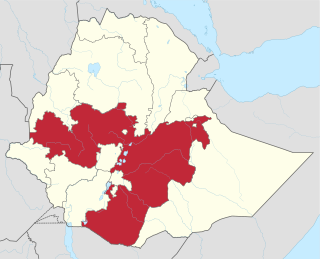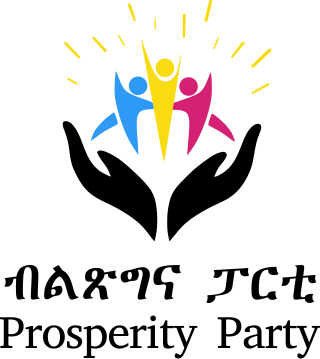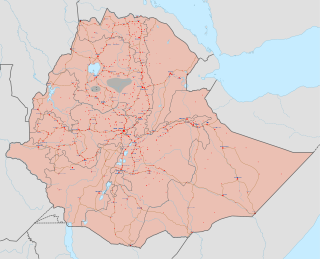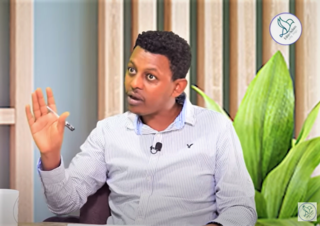This article needs additional citations for verification .(January 2022) |

The Wollo Oromo people are an Oromo subgroup inhabiting the historic Wollo Province of northern Ethiopia.
This article needs additional citations for verification .(January 2022) |

The Wollo Oromo people are an Oromo subgroup inhabiting the historic Wollo Province of northern Ethiopia.
The Wollo Oromo speak an Oromo dialect. However, linguistic descriptions of the Wollo and nearby Raya Oromo areas are still lacking. [1]
According to Hassan Hadiya, a resident of Kemise, the conflict started between Wollo Oromo people and Amhara Special Forces after Amhara Special Forces killed an individual at the entrances of the grand mosque in Ataye, Oromia zone of Amhara region. Ahmed says the Amhara Special Forces are attacking civilians and ongoing a blazing movement. eyewitness evidence blames the Amhara regional special forces while the Amhara regional government accuses both OLF-Shene and Tigray People's Liberation Front as a scapegoat of the violence. [2] [3]
Two Members of the Ethiopian parliament accused the Liyu police for killing Oromo civilians in Ataye, Oromia zone by labeling them what he called "bread name" which refers to OLF. "Amhara Militia used OLF-Shane as a pretext to commit war crime on Oromo farmers in Wollo for the three major reasons the MP said on 11th Session of parliament of Ethiopia.

Oromia is a regional state in Ethiopia and the homeland of the Oromo people. Under Article 49 of Ethiopian Constitution, the capital of Oromia is Addis Ababa, also called Finfinne. The provision of the article maintains special interest of Oromia by utilizing social services and natural resources of Addis Ababa.

The Oromo Liberation Front is an Oromo nationalist political party formed in 1973 to promote self-determination for the Oromo people inhabiting today's Oromia Region and Oromia Zone in the Amhara Region of Ethiopia. The OLF has offices in Addis Ababa, Washington, D.C., and Berlin, from which it operates radio stations that broadcast in Amharic and Oromo.

The Oromo Liberation Army is an armed opposition group active in the Oromia Region of Ethiopia. The OLA consist primarily of former armed members of the pre-peace deal Oromo Liberation Front (OLF) who refused to disarm out of skepticism of the peace deal, and former youth protestors who grew disillusioned with nonviolent resistance.

The 2014–2016 Oromo protests were a series of protests and resistance first sparked on 25 April 2014. The initial actions were taken in opposition to the Addis Ababa Master Plan, and resumed on 12 November 2015 by university students and farmers in the town of Ginchi, located 80 km southwest of Addis Ababa, encircled by the Oromia region. The plan was to expand the capital into the Oromia special zone, leading to fears that native Oromo farmers would lose their land and be displaced. The plan was later dropped but protests continued, highlighting issues such as marginalization and human rights. Mulatu Gemechu, deputy chairman of the opposition Oromo Federalist Congress, expressed to Reuters: "so far, we have compiled a list of 33 protesters killed by armed security forces that included police and soldiers but I am very sure the list will grow". Protesters demanded social and political reforms, including an end to human rights abuses like government killings of civilians, mass arrests, government land seizures, and political marginalization of opposition groups. The government responded by restricting access to the internet and attacking as well as arresting protesters.

The Oromo conflict is a protracted conflict between the Oromo Liberation Front (OLF) and the Ethiopian government. The Oromo Liberation Front formed to fight the Ethiopian Empire to liberate the Oromo people and establish an independent state of Oromia. The conflict began in 1973, when Oromo nationalists established the OLF and its armed wing, the Oromo Liberation Army (OLA). These groups formed in response to prejudice against the Oromo people during the Haile Selassie and Derg era, when their language was banned from public administration, courts, church and schools, and the stereotype of Oromo people as a hindrance to expanding Ethiopian national identity.

The 2021 Ethiopian general election to elect members of the House of Peoples' Representatives was held on 21 June 2021 and 30 September 2021. Regional elections were also held on those dates.
The Burayu massacre was a series of communal clashes which occurred in the vicinity of the Ethiopian town of Burayu, in the Oromia Region, on 14–16 September 2018. Individuals from the Oromo and Dorze ethnicities fought in and around Burayu, a town in Oromia Region which is located near the northwest boundary of Addis Ababa, the federal capital. Different sources cite number of civilians killed both from Oromo and non-Oromo ethnicity.

The Prosperity Party is a political party in Ethiopia that was established on 1 December 2019 as a successor to the Ethiopian People's Revolutionary Democratic Front (EPRDF) by incumbent Prime Minister Abiy Ahmed. The merger into a countrywide party is part of Abiy's general policy of distancing the country's politics from ethnic federalism. It ran for the first time in the 2021 general election.

The Benishangul-Gumuz conflict was an armed conflict mostly in the Metekel Zone of the Benishangul-Gumuz Region in Ethiopia that started in 2019, until peace agreement signed between the rebel groups and the government of Ethiopia in October 2022.

The ongoing Ethiopian civil conflict began with the 2018 dissolution of the Ethiopian People's Revolutionary Democratic Front (ERPDF), an ethnic federalist, dominant party political coalition. After the 20 year war between Ethiopia and Eritrea, a decade of internal tensions, two years of protests, and a state of emergency, Hailemariam Desalegn resigned on 15 February 2018 as prime minister and EPRDF chairman, and there were hopes of peace under his successor Abiy Ahmed. However, war broke out in the Tigray Region, with resurgent regional and ethnic factional attacks throughout Ethiopia. The civil wars caused substantial human rights violations, war crimes, and extrajudicial killings.

Kemise is a town and administrative seat of the Oromia Zone in the Amhara Region, Ethiopia. Kemise is 224 kilometres (139 mi) northeast of the Ethiopian capital, Addis Ababa and has a latitude and longitude of 10°43′N39°52′E with an elevation of 1424 meters above sea level. It was part of the former Chaffa Gola Dewerahmedo district and is now surrounded by the Dawa Chaffa district.
The 2021 Ataye clashes were two episodes of large-scale ethnic violence killing hundreds in and around the Ethiopian town of Ataye, leading to nearly a quarter of the town being destroyed and hundreds of thousands displaced.

The OLA insurgency is an armed conflict between the Oromo Liberation Army (OLA), which split from the Oromo Liberation Front (OLF) in 2018, and the Ethiopian government, continuing in the context of the long-term Oromo conflict, typically dated to have started with the formation of the Oromo Liberation Front in 1973.

Since the 1990s, the Amhara people of Ethiopia have been subject to ethnic violence, including massacres by Tigrayan, Oromo and Gumuz ethnic groups among others, which some have characterized as a genocide. Large-scale killings and grave human rights violations followed the implementation of the ethnic-federalist system in the country. In most of the cases, the mass murders were silent with perpetrators from various ethno-militant groups—from TPLF/TDF, OLF–OLA, and Gumuz armed groups.
The 1995 Ethiopian Federal Constitution formalizes an ethnic federalism law aimed at undermining long-standing ethnic imperial rule, reducing ethnic tensions, promoting regional autonomy, and upholding unqualified rights to self-determination and secession in a state with more than 80 different ethnic groups. But the constitution is divisive, both among Ethiopian nationalists who believe it undermines centralized authority and fuels interethnic conflict, and among ethnic federalists who fear that the development of its vague components could lead to authoritarian centralization or even the maintenance of minority ethnic hegemony. Parliamentary elections since 1995 have taken place every five years since enactment. All but one of these have resulted in government by members of the Ethiopian People's Revolutionary Democratic Front (EPRDF) political coalition, under three prime ministers. The EPRDF was under the effective control of the Tigray People's Liberation Front (TPLF), which represents a small ethnic minority. In 2019 the EPRDF, under Abiy, was dissolved and he inaugurated the pan-ethnic Prosperity Party which won the 2021 Ethiopian Election, returning him as prime minister. But both political entities were different kinds of responses to the ongoing tension between constitutional ethnic federalism and the Ethiopian state's authority. Over the same period, and all administrations, a range of major conflicts with ethnic roots have occurred or continued, and the press and availability of information have been controlled. There has also been dramatic economic growth and liberalization, which has itself been attributed to, and used to justify, authoritarian state policy.
On 18 June 2022, the Oromo Liberation Army (OLA) was accused of massacring over 500 Amhara civilians in the Gimbi county of Oromia Region, Ethiopia. Witnesses said that the OLA intentionally targeted ethnic Amhara people. This attack is part of a series of Amhara massacres that occurred in 2022.
The Amhara Association of America (AAA) (Amharic: የዐማራ ማህበር በአሜሪካ) is a non-profit organization based in Charlotte, North Carolina, focused on advocating for the human rights of the Amhara people in Ethiopia.

Political repression is a visible scenario under the leadership of Prime Minister Abiy Ahmed after 2018, characterized by severe human rights violation, restriction of press, speeches, dissents, activism and journalism that are critical to his government. Similar to TPLF-led EPRDF regime, there was a raise of censorship in the country, particularly internet shutdowns under the context of anti-terror legislation labelling them "disinformation and war narratives" since the raise of armed conflict in Ethiopia. In June 2018, Abiy unblocked 64 internet access that include blogs and news outlets.
The 2022 North Shewaclashes were a series of clashes that broke out between ethnic Amhara Fano militiamen, the Oromo Liberation Army, and the Ethiopian National Defence Forces in the North Shewa zone in the Oromia region and the Oromia Zone in the Amhara region, which resulted in dozens of people killed and thousands displaced.